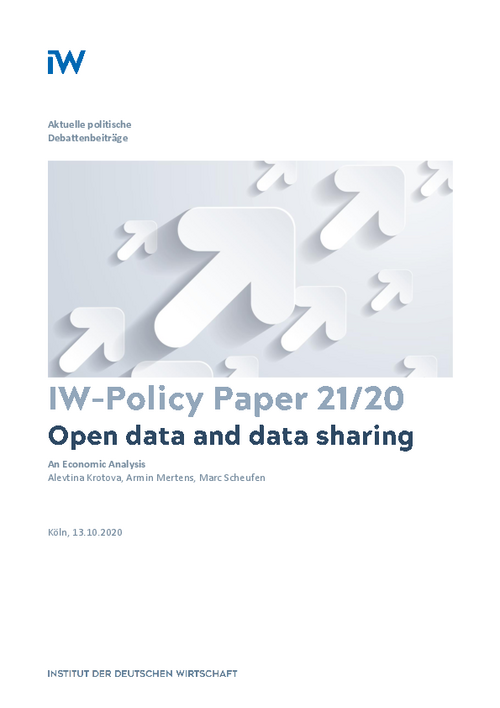Data is an important business resource. It forms the basis for various digital technologies such as artificial intelligence or smart services. However, access to data is unequally distributed in the market. Hence, some business ideas fail due to a lack of data sources.

An Economic Analysis: Open data and data sharing
IW-Policy Paper

Data is an important business resource. It forms the basis for various digital technologies such as artificial intelligence or smart services. However, access to data is unequally distributed in the market. Hence, some business ideas fail due to a lack of data sources.
Although many governments have recognised the importance of open data and already make administrative data available to the public on a large scale, many companies are still reluctant to share their data among other firms and competitors. As a result, the economic potential of data is far from being fully exploited. Against this background, we analyse current developments in the area of open data. We compare the characteristics of open governmental and open company data in order to define the necessary framework conditions for data sharing. Subsequently, we examine the status quo of data sharing among firms.
We use a qualitative analysis of survey data of European companies to derive the sufficient conditions to strengthen data sharing. Our analysis shows that government data is a public good, while company data can be seen as a club or private good. Latter frequently build the core for companies’ business models and hence are less suitable for data sharing. Finally, we find that promoting legal certainty and the economic impact present important policy steps for fostering data sharing.

Alevtina Krotova / Armin Mertens / Marc Scheufen: Open data and data sharing – An Economic Analysis
IW-Policy Paper


Mittelstand-Digital: Unterstützungsbedarfe in der digitalen Transformation
Der deutsche Mittelstand macht Fortschritte bei der digitalen Transformation, benötigt aber weiterhin Unterstützung im Aufholprozess. Mittelstand ist jedoch nicht gleich Mittelstand.
IW
Methodenbericht Remote: Extraktion von Remote-Angeboten aus Online-Stellenanzeigen
Forciert durch den Beginn der Corona-Pandemie Anfang 2020 hat sich das Angebot von Homeoffice in der Arbeitswelt fest etabliert – knapp ein Viertel der Beschäftigten arbeitet zumindest teilweise aus dem Homeoffice.
IW